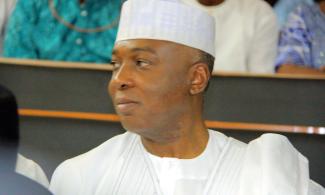
A prosecution witness testifying against the President of the Senate, Bukola Saraki, on Wednesday told the Code of Conduct Tribunal that documents relating to Mr. Saraki’s alleged transfer of $73, 233: 28 were burnt before the commencement of trial.

Mr. Saraki is standing trial at the Code of Conduct Tribunal for an alleged false and anticipatory declaration of assets.
The witness, Micheal Wetkas, told the tribunal during cross-examination by a defence counsel, Paul Usoro, that the documents relating to the said allegation, contained in count 11 of the charge against Mr. Saraki, was reported to have been burnt by a Nigerian bank, the Guaranty Trust Bank, where the said fund was transferred from.
“There is an affidavit, and I believe it was fire outbreak,” he stated
Mr. Wetkas, who told the tribunal that his investigative team came across the information concerning Mr. Saraki’s foreign account through several telexes from the American Express Bank, provided to the team by GTB.
He added that the requests made by his investigation team for the telexes were a result of a debit transaction noticed in Mr. Saraki’s account.
“There is no doubt that the transaction was actually carried out by American Express Bank,” the witness said.
“A debit in the account of the defendant was there, and the narration was clear that money was transferred and where it was transferred from.”
[Foramfera]
Mr. Wetkas added that GTB was invited and that the bank confirmed what it earlier stated regarding the transfer, and the burnt documents.
“There were also police reports and affidavit which they (the GTB) swore to show that some documents were burnt,” he stated.
While answering questions regarding whether or not he (Mr. Wetkas) knew if the American Express Bank was a bank incorporated or not, he said his investigation only related to the debit card sent from the bank.
“I know the bank exists through open source information. I do not believe anybody will carry his money and throw into a nonexistent account,” Mr. Wetkas said.
Also, when asked if there was anything on the form containing the details of the telex, relating an entry from the American Express Bank, Mr. Wetkas simply stated: “From my investigations that does not necessarily have to be there.”
When Mr. Usoro, insisted on getting a response to that question, Mr. Wetkas said there was nothing referring to the American Express Bank.
The Tribunal then went on short recess.